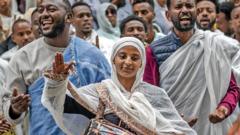Is Ethiopia Celebrating New Year Like It’s 2018?

Published: 2025-09-11 21:54:17 | Category: world
Ethiopia is welcoming its new year, 2018, in a celebration known as Enkutatash, which is marked by vibrant cultural practices and unique traditions. The Ethiopian calendar operates seven years behind the Gregorian calendar, tracing its roots back to differences in the calculation of Jesus Christ's birth year. This year, the festivities are particularly lively as the country embraces renewal and unity.
Last updated: 24 October 2023 (BST)
Key Takeaways
- Ethiopia celebrates New Year, 2018, on 11 September in the Gregorian calendar.
- The Ethiopian calendar has 13 months, with the last month consisting of five or six days.
- Enkutatash celebrations feature traditional foods, music, and cultural rituals.
- Common dishes include spicy chicken stew, mutton, and injera flatbread.
- The celebrations foster community bonding and reflect a sense of national pride.
The Ethiopian Calendar: A Unique Perspective
The Ethiopian calendar differs significantly from the Gregorian system, which is prevalent in most parts of the world. Ethiopia's calendar contains 13 months: twelve months of 30 days each and a thirteenth month called Pagumē, which has either five or six days, depending on whether it is a leap year. This unique structure places Ethiopia seven years behind the Western calendar. As of September 2023, Ethiopia is in the year 2018.
Why the Year Gap?
The divergence in the years stems from differing calculations of the birth of Jesus Christ. In 500 AD, the Catholic Church revised the date based on new evidence, but the Ethiopian Orthodox Church maintained the earlier date. This historical decision has led to the current seven-year difference, and Ethiopians are adept at switching between the two systems, depending on the context.
Enkutatash: The Celebration of Renewal
Enkutatash, which translates to "the gift of jewels," is celebrated on 11 September and signifies the end of the rainy season, the arrival of spring, and a time for renewal and optimism. It is a public holiday in Ethiopia, marked by family gatherings, church services, and lively festivities that reflect the rich cultural heritage of the nation.
Traditional Foods and Customs
Food plays a crucial role in the Enkutatash celebrations. Families often prepare traditional dishes to share with loved ones. Popular choices include:
- Doro Wat: A spicy chicken stew typically served with injera, a fermented flatbread.
- Mutton: Often roasted and served during larger gatherings.
- Oxen: In special cases, families may slaughter an oxen for an extravagant feast.
In the bustling markets of Addis Ababa, vendors sell chickens for those on a budget, with prices ranging from 2,000 to 3,000 birr (£10 to £14). For a more lavish meal, mutton can be priced between 15,000 and 22,000 birr (£77 to £105), and an ox can cost up to 300,000 birr (£1,550).
Celebratory Activities and Cultural Significance
As part of the celebrations, traditional coffee ceremonies play a vital role. Coffee, believed to have originated in Ethiopia, is prepared in a ceremonial manner using freshly cut grass and flowers, including the yellow "adey ababa" blooms that are abundant during this season. The ceremonies involve roasting coffee beans over an open flame, grinding them, and brewing them in a clay pot, often accompanied by snacks.
Festivities in Addis Ababa
The atmosphere in Addis Ababa during Enkutatash is vibrant. Despite the rain, the markets are bustling as people rush to gather last-minute supplies for the celebrations. Live concerts and performances are held across the city, where locals and visitors come together to enjoy music and dance.
On New Year's Eve, many people head to venues for concerts, ringing in the new year with music and sparklers. The following morning, the traditional song "Abebayehosh" can be heard throughout the city, performed by young girls who spread festive cheer by singing door-to-door.
Religious Observances
While Enkutatash is a secular celebration, it also includes significant religious elements, particularly among the Orthodox Christian population. Church services are held on New Year's Day, where prayers for the year ahead are offered. Vendors set up stalls to sell ceremonial items, such as umbrellas, outside churches, showcasing the intertwining of cultural and spiritual life in Ethiopia.
The Grand Ethiopian Renaissance Dam: A National Pride
This year’s celebrations are further enhanced by a sense of unity and national pride, particularly following the recent formal launch of the Grand Ethiopian Renaissance Dam (GERD). Located on a tributary of the River Nile, the dam represents a significant investment in Ethiopia's future and has become a symbol of progress and self-sufficiency.
The Spirit of Enkutatash
Enkutatash serves as a reminder of Ethiopia's rich cultural heritage, resilience, and community spirit. It encourages families to come together, share meals, and celebrate their hopes for the future. As the country moves forward, the celebrations of Enkutatash continue to foster a sense of belonging and cultural identity.
What Happens Next?
As Ethiopia embarks on its new year, citizens will likely embrace both the challenges and opportunities ahead. The sense of unity and national pride experienced during Enkutatash may play a crucial role in shaping Ethiopia's social and economic landscape in the coming year. The focus on renewal and optimism resonates deeply within the hearts of Ethiopians as they look forward to a prosperous future.
FAQs
What is Enkutatash?
Enkutatash is the Ethiopian New Year celebration, marking the beginning of the year 2018 on the Ethiopian calendar. It is a time for family gatherings, traditional meals, and cultural festivities.
How does the Ethiopian calendar work?
The Ethiopian calendar consists of 13 months: 12 months of 30 days each and one month with five or six days. It is seven years behind the Gregorian calendar due to differences in calculating Jesus Christ's birth year.
What traditional foods are served during Enkutatash?
Common dishes include doro wat (spicy chicken stew), injera (flatbread), and roasted mutton. Some families may also prepare an oxen for larger gatherings.
What cultural activities take place during Enkutatash?
Celebrations feature lively markets, traditional coffee ceremonies, and music performances. Young girls often sing the traditional song "Abebayehosh" to spread festive cheer.
Is Enkutatash a religious celebration?
While Enkutatash has secular elements, it also includes significant religious observances, particularly among Orthodox Christians, who attend church services on New Year's Day.



